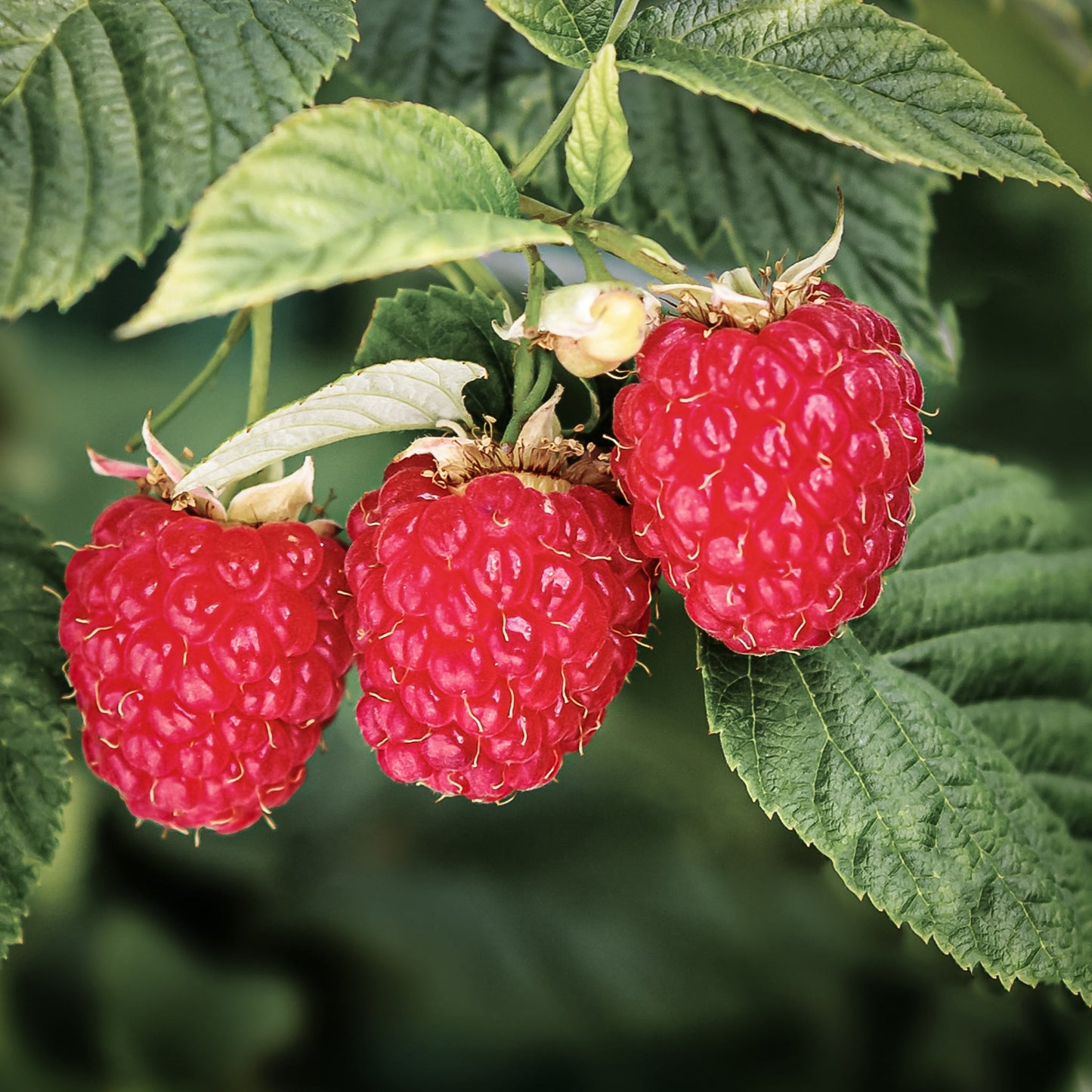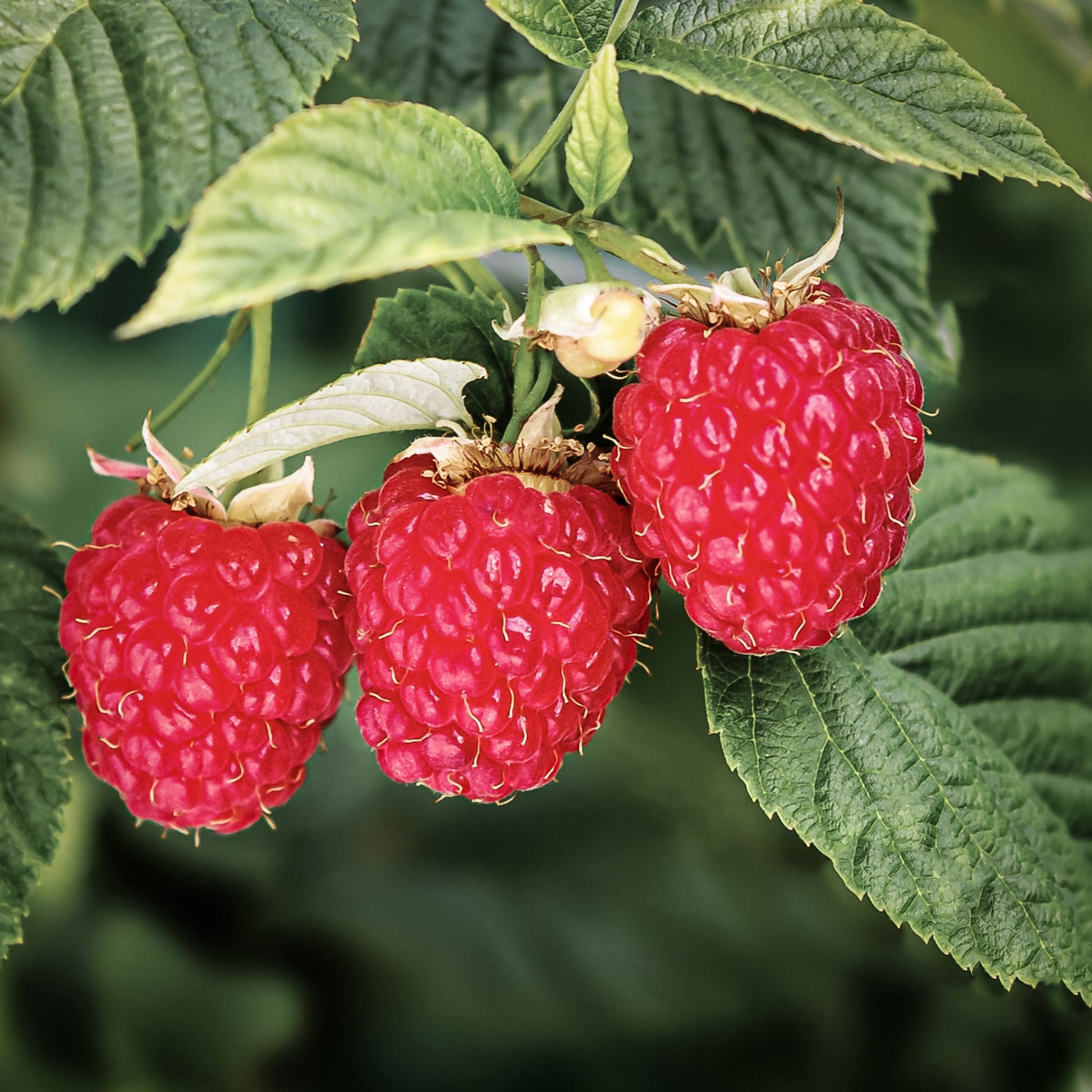Fruits And Shoots Plant Farm LTD.
Raspberry | Boyne
Raspberry | Boyne
Couldn't load pickup availability
Boyne is a Canadian bred variety, well suited to our climate. Boyne is a summer bearing raspberry meaning that it produces all of its berries on last year's canes. The new stems will be for the following year’s fruit and should be tied to a trellis system to keep the raspberry patch tidy. Boyne produces a medium sized sweet berry in early summer. The stems are stocky and strong and Boyne is able to remain upright when trellising is not an option. Raspberries grow best in a slightly acidic, moist but well drained soil, (avoid clay or heavy soils.) We recommend adding wood chips in the planting row and mulching around the canes to conserve moisture and add tilth to the soil. Raspberries are self fertile.
Summer bearing raspberries bear most of their fruit in a 3-4 week period in a large harvest. The best way to maintain and prune summer bearing raspberries is to remove all canes that have fruited during the dormant season. These fruited stems will be a light gray color compared to the new canes that will still have some green or red color to them. Trellising is recommended to support the fruit. Advantages to summer bearing raspberries include their ability to produce all their fruit in a short season which is great for freezing or juicing.
Everbearing raspberries will bear on last year's canes and on the canes that have grown up in that season. They usually begin with a crop in June and July from last years’ canes and then in September come through with a fresh crop of berries produced on new growth from the summer season. Pruning these is a little trickier because the aim is to remove the oldest and driest stems from the patch while leaving the younger canes even if they did fruit in the fall. The remaining canes will fruit again in the spring. Advantages to everbearing raspberries is that they provide a snack again and again throughout the entire summer and into the fall. Though they never produce a huge amount, they spread their harvest out, providing a welcome treat over a 4 month period.
Alternatively, everbearing canes can be cut to the ground every winter and allowed to grow up and fruit in the fall. While this means they won’t fruit at all during the early summer months, they will yield a bountiful fall harvest with the easiest pruning regimen.

Common Raspberry Questions
What type of soil do raspberries need?
Raspberries grow best in slightly acidic, moist but well-drained soil. Avoid heavy clays. We recommend adding wood chips in the planting row and mulching around the canes helps conserve moisture and improve soil tilth.
How do I prune summer-bearing raspberries?
Summer-bearing raspberries produce fruit in a concentrated 3-4 week period, making them ideal for freezing or juicing. The best way to maintain and prune summer bearing raspberries is to remove all canes that have fruited during the dormant season. These fruited stems will be a light gray color compared to the new canes that will still have some green or red color to them.
How do I prune everbearing raspberries?
Everbearing raspberries produce fruit in early summer on last year's canes (floricanes) and again in fall on new growth (primocanes). To maintain them, prune out the oldest and driest canes while keeping the new growth, even if they fruited in fall, as they will fruit again next spring. Alternatively, everbearing canes can be cut to the ground every winter and allowed to grow up and fruit in the fall. While this means they won’t fruit at all during the early summer months, they will yield a bountiful fall harvest with the easiest pruning regimen.
Summer-bearing v.s Everbearing?
Summer-bearing raspberries produce a large, concentrated harvest in a short period, making them ideal for preserving, but they only fruit once per season. Everbearing raspberries provide a steady supply of berries from early summer into fall, offering fresh fruit for months, but they yield smaller amounts at a time. Everbearing varieties also require more selective pruning unless cut to the ground annually, while summer-bearing types have a simpler pruning routine.

